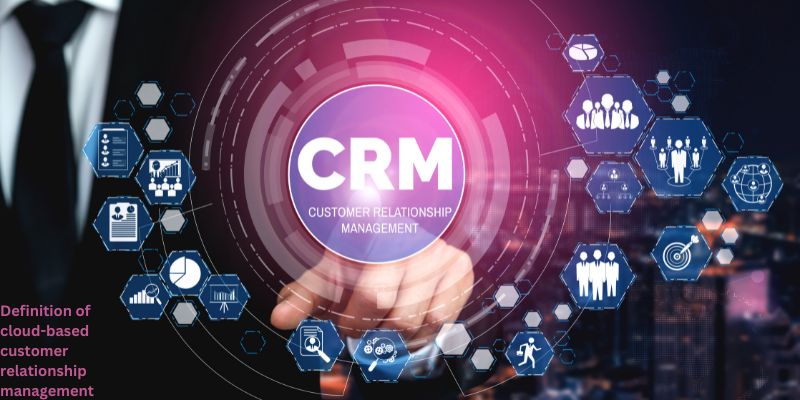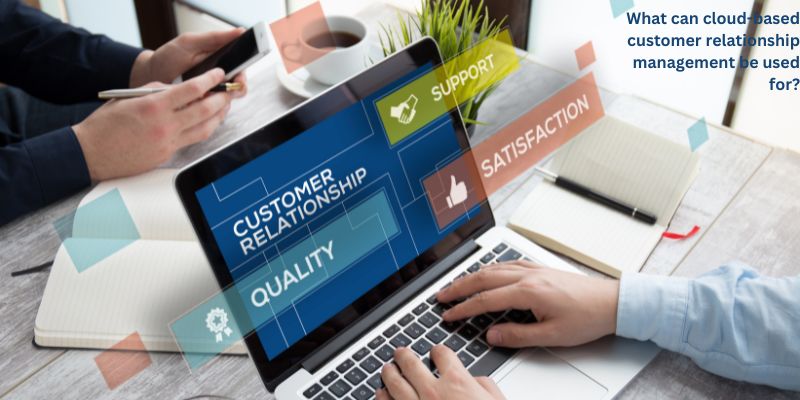Cloud-based customer relationship management is the process of organizing and making sense of client interactions throughout an organization by gathering and analyzing pertinent customer-related data. This data is kept in a specialized database called a customer relationship management (CRM) platform. These are increasingly being housed on the cloud, which offers simple access, quick processing, and the scalability needed to meet an organization’s changing demands. In this technology news, let’s find out some useful information about cloud-based customer relationship management with acameramen.com!
1. Definition of cloud-based customer relationship management

Internet connectivity is required to use the customer relationship management software, which is hosted in the cloud by the provider. Software as a Service (SaaS) is another name for this sort of software solution. As CRM solutions can also be stored locally within the organization, this hasn’t always been the case. On-premises CRMs demand more continuing staffing requirements and a higher initial investment than cloud-based CRM solutions.
2. Benefits of cloud-based customer relationship management
Numerous advantages of a cloud-based CRM include increased productivity and efficacy in client contacts, as well as simplicity in updates and scalability. Most significantly, it helps the organization to improve the effectiveness of internal operations while honing its customer service offering.
Installation is simple since organizations may quickly modify consumer tactics without incurring the up-front fees and complexity of establishing these internally.
Operational simplicity: Because the CRM provider is in charge of handling hardware and maintenance expenditures, businesses are spared this expense. In consequence, this lessens the organization’s infrastructure load while also facilitating simple flexibility as circumstances and needs change over time.
Collaboration is made simple since every employee of a company can easily access the pertinent client information whenever they need it, whether they are based on-site or working remotely. This keeps everyone up to date. With online operations, it is simpler to have a connected, modern workforce, enabling the company to be more responsive to evolving client wants and behavior as they occur.
A cloud-based CRM is a flexible choice that guarantees flexibility and room to grow as the company’s needs evolve and expand. A CRM powered by the cloud provides the tools and functionality that may be used as needed to adjust to shifting client demands and behaviors.
Enhanced security: It is important to pay attention to security in all areas of the organization, including the CRM. A platform that runs on the cloud makes it quick and easy to deal with backups, bugs, and other events.
3. What can cloud-based customer relationship management be used for?

A CRM’s functionality determines how useful it is. There are certain crucial elements that will promote improved business outcomes when evaluating a system’s ability to manage client interaction.
Customer data: A CRM must, first and foremost, be filled with all of the pertinent customer data needed to comprehend and engage with clients. Additionally, keeping track of contacts, meetings, and even pertinent documents in the CRM will facilitate intelligent, seamless team involvement.
Platform connections: The CRM will be more effective if it has the ability to connect to and interact with other company technologies like email and website hosting platforms. In order to make sure you can utilize your CRM solutions to their full potential, flexibility and customization will be crucial.
Dashboard: Think of the dashboard as the driver’s seat, allowing any employee to quickly and easily dial up and display consumer insights across a wide variety of metrics and data points. The system’s effectiveness increases with ease of use since anybody seeing the data may find and act on pertinent insights.
Automation: By allowing automation that increases productivity and enhances customer interaction, an intelligent CRM should relieve the strain of increasingly repeated operations. A CRM like Salesforce has a significant feature called the ability to simplify workflows.Sales funnel management: A CRM should make it easier to track and measure campaigns, record, score, and track leads as they go through the pipeline, manage conversions, and analyze projections, among other tasks.
Data management: A CRM must have strong data security in place since it houses the organization’s priceless customer data. Data backup plans and security procedures to safeguard private customer and organizational data should be included.
4. How to choose good cloud-based customer relationship management

To make the most of this potent platform, selecting a cloud-based CRM should comprise a number of critical procedures.
- Describe the demands. – What are the objectives and needs of the organization? To serve as criteria for contrasting various CRM alternatives, they must be precisely stated.
- Set the budget – No one has infinite resources, so setting a budget can help you prioritize your list of desired features while balancing the costs of various CRM options.
- Recognize the merits and qualities – While bells and whistles are fun, it’s crucial to understand what the CRM delivers and how they will assist the organization achieve its goals.
- Select the ideal mate – Selecting the appropriate partner for your cloud-based CRM solution is essential. As things change over time, be sure the partner you select can assist you in meeting the organization’s needs both now and in the future.
Conclusion
Internet connectivity is required to use the cloud-based customer relationship management software. Software as a Service (SaaS) is another name for this sort of software solution. As CRM solutions can also be stored locally within the organization, this hasn’t always been the case. On-premises CRMs demand more continuing staffing requirements and a higher initial investment than cloud-based CRM solutions.
I hope you found this article about cloud-based customer relationship management useful. Have a good day!